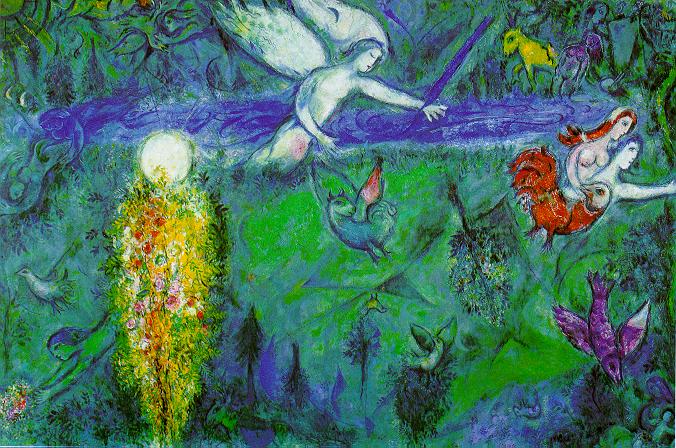Spiritual Sunday
When I read parts of Paradise Lost in high school and then again in college, I was enthralled by the grandeur. As I have aged, however, I have found myself focusing less on the grand gestures and more on the intimate moments. I taught it last week in my survey course (Books I, II, III, IV, IX, X and XII) and was struck by how it now seems more a melodrama than an epic. The scenes that grip me the most are Adam and Eve blaming each other after the fall and then finding it within themselves to apologize and ask for forgiveness. (The narcissistic Satan lacks the greatness to do this.) My sense now is that Milton is writing Paradise Lost to shed his love of the grandiosity and embrace simple domestic drama.
At the beginning of the poem, of course, he grandly declares that his goal is “to assert Eternal Providence/And justify the ways of God to men.” But one can a personal goal behind this grand intent. He wants to understand why God has decreed that he himself must suffer: why is he blind, why was he put in prison, why does his life seem to be falling apart?
By the end of his poem, he has found some answers. Or rather, he has found a way to accept his diminished life. Here’s Adam talking about what he has learned, both from the fall and from the Archangel Michael’s description of Jesus’s future sacrifice for humankind:
Henceforth I learn, that to obey is best,
And love with fear the only God; to walk
As in his presence; ever to observe
His providence; and on him sole depend,
Merciful over all his works, with good
Still overcoming evil, and by small
Accomplishing great things, by things deemed weak
Subverting worldly strong, and worldly wise
By simply meek: that suffering for truth’s sake
Is fortitude to highest victory,
And, to the faithful, death the gate of life;
Taught this by his example, whom I now
Acknowledge my Redeemer ever blest.
Michael replies that, by having learned this, Adam has “attained the sum of wisdom” and need “hope no higher.” He then says that Adam must live his life in a way that corresponds with his new understanding:
only add
Deeds to thy knowledge answerable; add faith,
Add virtue, patience, temperance; add love,
By name to come called charity, the soul
Of all the rest . . .
And then, in the sentence’s continuation, Michael reverses one of Satan’s earlier statements. A believer in the power of will, Satan has asserted that “the mind can make a heaven of hell, a hell of heaven”—and then proves it by creating a mental hell for himself. Adam, by contrast, can find a paradise on earth even greater than the paradise from which he is being expelled. Here’s Michael:
. . . then wilt thou not be loth
To leave this Paradise, but shalt possess
A Paradise within thee, happier far.
To sum up, how will we find heaven? By walking humbly before God, knowing that He or She can work through the small and weak to achieve great things; by being confident that suffering for truth’s sake will bring us to the gates of life; and by adding faith,virtue, patience, temperance, and, above all, loving charity to our daily practice. The paradise that results will not be in the past or the future but right now.
Go here to subscribe to the weekly newsletter summarizing the week’s posts. Your e-mail address will be kept confidential.


